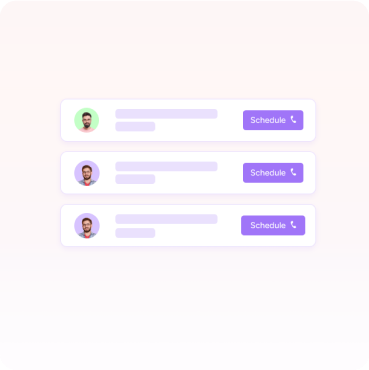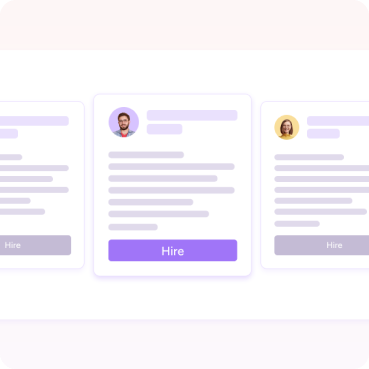Regular hiring
High RiskHire React Native Developer of Silicon Valley caliber
Hire pre-vetted full time remote React Native Developer from India. Hire now and build your dream engineering team with Hyno
Join 4,000+ companies already growing








Our Top Remote Developers
Hyno conducts rigorous testing and carefully vets the developers who are fueled by passion and skill sets. Hence, our developer community is the foundation for innovation and collaboration, bringing ideas and projects to fruition.
OUR STANDARDS
Hyno vs. Your regular recruitment process.
Find a risk-free, pre-interviewed, high-quality developer who is remote-ready in less than 2 weeks at 40% less cost.
Parameters
Choose the right for your firm.Time
Fees
Quality
Pre Screening
Remote readiness check
Termination
Failure rate
1 - 4 Months
> $1000
High
Low
Freelancing
High Risk1 - 2 Months
No fee
No
Very high
 Low Risk
Low Risk
0 - 15 Days
No fee
No
Very low
Pricing Starts from $35/hr
Accomplishing everything in just 3 steps
Our technical manager aligns the required skillset and tech stack with our talent pool to help you find the best fit.

Shortlisting candidates
Precise Hiring: Understanding, Gathering, and Shortlisting nittygritty.
-
 We start by thoroughly understanding your unique needs and specifications.
We start by thoroughly understanding your unique needs and specifications.
-
 check markWe
align the developer details with company goals. This way, we tailor the candidate
selection to seamlessly integrate with the organization’s vision and goals.
check markWe
align the developer details with company goals. This way, we tailor the candidate
selection to seamlessly integrate with the organization’s vision and goals.


Scheduling an Interview
Effortless talent selection: Finding your perfect match
-
 We connect you with the chosen candidates to ensure a personalized experience.
We connect you with the chosen candidates to ensure a personalized experience.
-
 Our rigorous
selection process guarantees that you find candidates who align seamlessly with your
requirements.
Our rigorous
selection process guarantees that you find candidates who align seamlessly with your
requirements.


Onboarding the talent
Streamlined onboarding for peak performance.
-
 The selected/qualified talent integrates smoothly through structured onboarding to
quickly adapt to projects, processes, and team dynamics.
The selected/qualified talent integrates smoothly through structured onboarding to
quickly adapt to projects, processes, and team dynamics.
-
 We go beyond
integration to offer ongoing support for a seamless transition to ensure that the
new talent exceeds your expectations.
We go beyond
integration to offer ongoing support for a seamless transition to ensure that the
new talent exceeds your expectations.


Read hiring guide
A one-stop shop to hiring the right React Native Developer
How to hire a React Native Developer? Skills to look for, interview questions, and more
Hiring a dedicated developer for your business can
be a cumbersome task. As many companies are competing to hire top React Native
developers,
so finding a good developer is not as easy as it may seem.
We're here to assist all employers who choose to hire React Native Developer on
their
own. Recruiting a developer on your own requires a fair amount of software
development experience in general. However, if you're a non-technical manager
interested in learning more about how to hire a React Native Developer, we've put
up
an excellent resource for you.
Things to check Key Skills Required for a React Native Developer?
The following are the key skills that a developer should possess to become proficient in React Native:
1. React Native Framework: The candidate should have a strong understanding of the React Native framework and its core components such as JSX, components, props, state, and lifecycle methods.
2. JavaScript: React Native relies heavily on JavaScript, so the candidate should be proficient in writing clean and efficient JavaScript code, with knowledge of ES6 and its newer features.
3. Mobile App Development: The candidate should have experience developing mobile applications, with knowledge of mobile app development concepts such as responsive design, cross-platform compatibility, performance optimization, and user experience (UX) design.
4. APIs and Web Services: The candidate should have experience working with APIs and web services to integrate data and functionality into mobile applications.
5. Debugging and Troubleshooting: The candidate should have experience debugging and troubleshooting issues in React Native applications, with knowledge of tools such as React Native Debugger and Chrome DevTools.
6. Git and Version Control: The candidate should have experience using Git and version control systems, with knowledge of branching and merging strategies, and ability to collaborate with a team.
7. Third-party Libraries and Plugins: The candidate should have experience working with third-party libraries and plugins, with knowledge of popular React Native libraries such as Redux, React Navigation, and NativeBase
8. Mobile App Security: The candidate should have knowledge of mobile app security concepts such as user authentication, secure data storage, and SSL/TLS encryption.
9. Integration with Native Modules: The candidate should have knowledge of how to integrate React Native with native modules using Java or Objective-C/Swift.
10. Publishing to App Stores: The candidate should have knowledge of the app publishing process, with experience publishing React Native apps to the Apple App Store and Google Play Store.
Ideal Hiring Process for React Native Developer
1. Define the Job Description: Start by creating a clear and detailed job description that outlines the specific skills and experience you are looking for in a React Native developer.
2. Post the Job: Post the job on job boards and websites that cater to remote workers. You can also reach out to your network or use recruitment agencies to find suitable candidates.
3. Review Resumes: Once you start receiving applications, review each resume to identify candidates who meet the requirements outlined in the job description.
4. Conduct Initial Interviews: Schedule initial interviews with selected candidates to learn more about their experience, skills, and availability. This could be done through a phone call, video chat or instant messaging app.
5. Technical Assessment: Administer a technical assessment to test the candidate's React Native skills. This could be a coding challenge, technical quiz, or review of their previous projects.
6. Second Interview: Invite candidates who performed well in the technical assessment to a second interview. This interview should focus on their cultural fit, work style, communication skills, and their motivation for working remotely.
7. Check References: Request references from the candidate to verify their work experience and get feedback from previous employers.
8. Offer Letter: Once you have identified the ideal candidate, send them an offer letter that outlines the terms of the job, including salary, benefits, and working hours.
9. Onboarding: Once the candidate has accepted the offer, start the onboarding process to familiarize them with your company, policies, and tools. Make sure to schedule regular check-ins and set clear expectations to ensure a successful remote working relationship.
Important Interview questions to ask to Hire a React Native Developer
What inspired you to become a React Native developer, and how long have you been using this framework?
I was inspired to become a React Native developer because of its flexibility and ability to create native mobile applications for both iOS and Android using one codebase. I have been using React Native for X years now, and I have a strong understanding of its architecture and features.
What was your most challenging project using React Native, and how did you overcome it?
My most challenging project using React Native was X. The project required integrating multiple third-party libraries, and I had to find a way to handle the differences between the platforms. I overcame it by doing extensive research and experimenting with various approaches.
How do you ensure the performance of your React Native applications?
I ensure the performance of my React Native applications by using profiling tools like the React Native Performance Monitor, identifying bottlenecks in the code, optimizing the use of resources, and minimizing the number of renders and re-renders.
Can you explain the differences between state and props in React Native?
State is a data that can be changed within a component, and it can trigger a re-render of the component. Props are read-only data that is passed from the parent component to the child component. Props cannot be changed by the child component.
How do you handle asynchronous operations in React Native?
I handle asynchronous operations in React Native by using the async/await syntax, Promises, and callbacks. I also use libraries like Redux-Saga and Thunk to manage complex asynchronous operations.
How do you handle different screen sizes in React Native?
I handle different screen sizes in React Native by using responsive design principles and implementing flexbox layouts. I also use third-party libraries like react-native-responsive-screen to ensure that my application is responsive to different screen sizes.
How do you handle errors and debugging in React Native?
I handle errors and debugging in React Native by using debugging tools like React Native Debugger, the Chrome Developer Tools, and the React Native CLI Debugger. I also use logging tools like Redux-Logger and Reactotron to help me identify errors in my code.
How do you collaborate with other developers in a React Native project?
I collaborate with other developers in a React Native project by using version control systems like Git, using project management tools like Trello and JIRA, and communicating frequently through Slack, Zoom, or other communication platforms.
Can you explain the differences between React Native and ReactJS?
React Native is a framework for building native mobile applications, while ReactJS is a library for building web applications. React Native uses native components, while ReactJS uses HTML, CSS, and JavaScript to render web pages.
How do you stay up to date with the latest updates and features in React Native?
I stay up to date with the latest updates and features in React Native by attending conferences, reading blogs, participating in online forums, and following the React Native community on social media platforms like Twitter and Reddit. I also read the official React Native documentation and release notes.
Job Description Template for React Native Developer
Location: [Insert Location]
Job Title: React Native Developer
Position Type: Full-Time
Salary: [Insert Salary Range]
We are looking for a talented React Native Developer to join our dynamic team. As a React Native Developer, you will be responsible for building high-quality, cross-platform mobile applications for iOS and Android platforms. You will work closely with our UX/UI designers, product owners, and other developers to ensure that our applications are responsive, scalable, and meet our users' needs.
Key Responsibilities:
- Develop and maintain high-quality React Native mobile applications for iOS and Android platforms
- Collaborate with designers, product owners, and other developers to ensure that the applications meet the business requirements and users' needs
- Write clean, maintainable, and scalable code that follows the best practices and coding standards
- Conduct code reviews, debugging, and troubleshooting of production issues
- Optimize the performance of the applications and ensure they are responsive and scalable
- Stay up-to-date with the latest trends, technologies, and best practices in React Native development and implement them in the projects
Requirements:
- Proven experience as a React Native Developer with at least X years of experience
- Strong proficiency in React Native, JavaScript, and TypeScript
- Solid understanding of ReactJS and its core principles
- Experience with third-party libraries and APIs integration
- Familiarity with native build tools, like Xcode and Android Studio
- Experience with Git and agile development methodologies
- Good problem-solving, communication, and collaboration skills
- Bachelor's degree in Computer Science or related field
Preferred Qualifications:
- Experience with Redux, Redux-Saga, or other state management libraries
- Knowledge of React Native best practices and common design patterns
- Experience with CI/CD tools and processes
- Familiarity with GraphQL and RESTful APIs
- Strong understanding of software design principles and software engineering practices
If you are an experienced React Native Developer who enjoys working in a fast-paced, challenging environment, we would love to hear from you. Please submit your resume and cover letter for consideration.